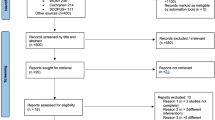Abstract
Data sources Data was collected utilising Medline (OVID interface), Google Scholar and Cochrane Library. Systematic reviews with/without meta-analysis were selected which included patient satisfaction and oral health-related quality of life as outcome measures. The literature search performed included systematic reviews with publication dates ranging from 1946 to 2018. PROSPERO was also used to incorporate systematic reviews that had been completed after the last search in August 2018.
Study selection Studies were selected using the PICO model, selecting systematic reviews analysing adult edentulous patients with conventional complete dentures and/or implant-retained overdentures. The systematic reviews chosen assessed satisfaction and oral health-related quality of life, while comparing results to adult edentulous patients with no replacement teeth or prosthesis.
Data extraction and synthesis All of the articles located from the database searches were uploaded to reference management software. Articles were screened independently by two authors to reduce bias and to assess the articles against the predetermined inclusion criteria. The EndNote filter Service was applied to avoid duplication of articles. Guidance from the Centre for Reviews and Dissemination (University of York) was incorporated to present data narratively, with text and tables. Eight reviews were included in data synthesis.
Results Of the eight reviews included, six were systematic reviews without meta-analysis, one systematic review with meta-analysis was included and one was meta-analysis.
Conclusions The results of this systematic review highlight the greater benefits of implant retained overdentures compared with conventional complete dentures when assessing patient satisfaction and oral health-related quality of life. The superiority of implant retained overdentures is most evident when patients cannot tolerate conventional complete dentures. However, consideration most be given to the adaptive capabilities of patients and the financial implications of implant-retained overdentures.
Similar content being viewed by others
A commentary on
Sharka R, Abed H, Hector M.
Oral health-related quality of life and satisfaction of edentulous patients using conventional complete dentures and implant-retained overdentures: An umbrella systematic review. Gerodontology 2019; 36: 195-204.

GRADE rating
Commentary
This is an umbrella systematic review (a review of systematic reviews) which used Joanna Briggs Institute (JBI) methodology to appraise the data presented in multiple systematic reviews on the impacts of complete conventional dentures (CCDs) and/or implant-retained overdentures (IRODs) on the oral health-related quality of life (OHRQoL) and satisfaction among edentulous patients. The eligibility criteria for included reviews were clearly defined using a PICO model and three electronic databases were searched for relevant literature. The levels of evidence of the included reviews were assessed using the Scottish Intercollegiate Guideline Checklist and the risk of bias was assessed using the Critical Appraisal Skills Programme (CASP) systematic review checklist. In total eight reviews were included in the data synthesis.
The umbrella review demonstrates that IRODs provide improved results compared to CCDs in terms of OHRQoL outcomes and patient satisfaction. These outcomes were described narratively as the use of varying methodologies prevented statistical comparison of data. The authors suggest that the greatest improvement in OHRQoL scores and patient satisfaction is likely to be observed in patients who are poorly adapted to CCDs. Therefore in well adapted patients, IRODs may not offer significant improvements over CCDs. The role that CCDs still have for edentulous patients should also be considered as this review highlights that well-made CCDs in patients with favourable oral anatomy can still provide an effective and adequate treatment option for many edentulous patients.
Although the results of this systematic review conclude that IRODs provide higher levels of oral health-related quality of life and satisfaction, it is important to acknowledge dental implants are not routinely offered in public dental services in many countries. This is due to the economic costs associated with provision and maintenance of dental implants for patients. The cost of treatment and training must be considered, while recognising the challenges involved with providing and maintaining IRODs in a primary care setting.
This systematic review highlights the importance of improving both undergraduate and postgraduate teaching surrounding the provision of IRODs. It also highlights the importance of enhancing general dental practitioners' confidence with provision of CCDs provided for edentulous patients in primary care. Although this review concludes IRODs provide superior treatment outcomes in terms of patient satisfaction and OHRQoL, CCDs are still a viable treatment option for many patients. To improve the standard of care provided for these patients it is imperative that general dental practitioners and specialists work effectively together to help improve satisfaction and OHRQoL for edentate and geriatric patients.
Author information
Authors and Affiliations
Rights and permissions
About this article
Cite this article
Kelly, N., McKenna, G. The benefits of implant-retained overdentures as a treatment modality for patients in primary care settings. Evid Based Dent 21, 89 (2020). https://doi.org/10.1038/s41432-020-0118-2
Published:
Issue Date:
DOI: https://doi.org/10.1038/s41432-020-0118-2



